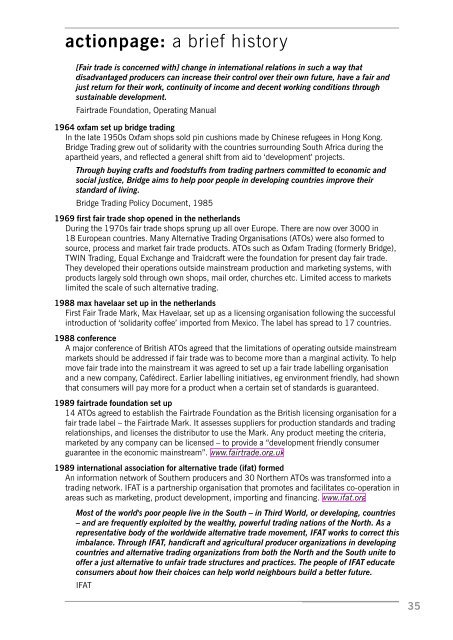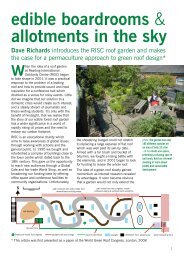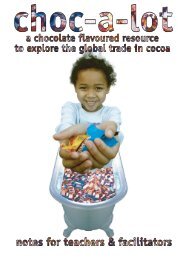Cost of coffee.indd - RISC
Cost of coffee.indd - RISC
Cost of coffee.indd - RISC
You also want an ePaper? Increase the reach of your titles
YUMPU automatically turns print PDFs into web optimized ePapers that Google loves.
actionpage: a brief history<br />
[Fair trade is concerned with] change in international relations in such a way that<br />
disadvantaged producers can increase their control over their own future, have a fair and<br />
just return for their work, continuity <strong>of</strong> income and decent working conditions through<br />
sustainable development.<br />
Fairtrade Foundation, Operating Manual<br />
1964 oxfam set up bridge trading<br />
In the late 1950s Oxfam shops sold pin cushions made by Chinese refugees in Hong Kong.<br />
Bridge Trading grew out <strong>of</strong> solidarity with the countries surrounding South Africa during the<br />
apartheid years, and reflected a general shift from aid to ‘development’ projects.<br />
Through buying crafts and foodstuffs from trading partners committed to economic and<br />
social justice, Bridge aims to help poor people in developing countries improve their<br />
standard <strong>of</strong> living.<br />
Bridge Trading Policy Document, 1985<br />
1969 first fair trade shop opened in the netherlands<br />
During the 1970s fair trade shops sprung up all over Europe. There are now over 3000 in<br />
18 European countries. Many Alternative Trading Organisations (ATOs) were also formed to<br />
source, process and market fair trade products. ATOs such as Oxfam Trading (formerly Bridge),<br />
TWIN Trading, Equal Exchange and Traidcraft were the foundation for present day fair trade.<br />
They developed their operations outside mainstream production and marketing systems, with<br />
products largely sold through own shops, mail order, churches etc. Limited access to markets<br />
limited the scale <strong>of</strong> such alternative trading.<br />
1988 max havelaar set up in the netherlands<br />
First Fair Trade Mark, Max Havelaar, set up as a licensing organisation following the successful<br />
introduction <strong>of</strong> ‘solidarity c<strong>of</strong>fee’ imported from Mexico. The label has spread to 17 countries.<br />
1988 conference<br />
A major conference <strong>of</strong> British ATOs agreed that the limitations <strong>of</strong> operating outside mainstream<br />
markets should be addressed if fair trade was to become more than a marginal activity. To help<br />
move fair trade into the mainstream it was agreed to set up a fair trade labelling organisation<br />
and a new company, Cafédirect. Earlier labelling initiatives, eg environment friendly, had shown<br />
that consumers will pay more for a product when a certain set <strong>of</strong> standards is guaranteed.<br />
1989 fairtrade foundation set up<br />
14 ATOs agreed to establish the Fairtrade Foundation as the British licensing organisation for a<br />
fair trade label – the Fairtrade Mark. It assesses suppliers for production standards and trading<br />
relationships, and licenses the distributor to use the Mark. Any product meeting the criteria,<br />
marketed by any company can be licensed – to provide a “development friendly consumer<br />
guarantee in the economic mainstream”. www.fairtrade.org.uk<br />
1989 international association for alternative trade (ifat) formed<br />
An information network <strong>of</strong> Southern producers and 30 Northern ATOs was transformed into a<br />
trading network. IFAT is a partnership organisation that promotes and facilitates co-operation in<br />
areas such as marketing, product development, importing and financing. www.ifat.org<br />
Most <strong>of</strong> the world's poor people live in the South – in Third World, or developing, countries<br />
– and are frequently exploited by the wealthy, powerful trading nations <strong>of</strong> the North. As a<br />
representative body <strong>of</strong> the worldwide alternative trade movement, IFAT works to correct this<br />
imbalance. Through IFAT, handicraft and agricultural producer organizations in developing<br />
countries and alternative trading organizations from both the North and the South unite to<br />
<strong>of</strong>fer a just alternative to unfair trade structures and practices. The people <strong>of</strong> IFAT educate<br />
consumers about how their choices can help world neighbours build a better future.<br />
IFAT<br />
35




